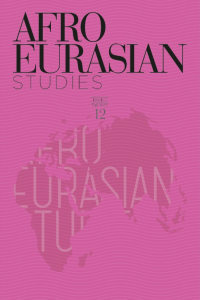Abstract
References
- Ansary, A. F. (1994). « Ali Abderraziq et le projet de remise en ordre de la conscience islamique », Égypte/Monde arabe, online, URL : http://journals.openedition.org/ema/542, [visited on 07-07-22]
- Djenidi, A. (1976). « Cheikh Moussa Kamara et sa réflexion sur l’exercice du pouvoir au Fouta Toro », Annales de faculté des lettres et sciences humaines, n°6, pp.309-316.
- Djenidi, A. (1984). « Un théoricien de l’anti-jihad : le sénégalais Cheikh Musa Kamara (1863-1945) », Annales de faculté des lettres et sciences humaines, n°14, pp.225-238.S
- Ḥusayn ‘A. ‘A. (2012). introduction to the new edition of ‘Alī ‘Abd al-Rāziq. Al-Isām wa uṣūl al-ḥukm. Caire & Beyrouth: Dār al-Kitāb al-Miṣrī & Dār al-Kitāb al-Lubnānī.
- Kamara, C. M. (1976). « Condamnation de la guerre sainte », Introduction and translation by Amar Samb, Bulletin de l’IFAN, T.38, sér. B, n°1, pp.158-199.
- Kamara, C. M. (2003) Akṯar al-rāġibīn fī-l-jihād ba‘d al-nabiyyīn man yaḫtār al-ẓuhūr wa milk al-‘ibād wa lā yubālī bi min halaka fī jihādihī min al-‘ibād. Rabat: Manšūrāt Ma‘had al-Dirāsāt al-Ifrīqiyya.
- Marongiu-Perria, O. (2017). Rouvrir les portes de l’islam. Paris : Atlande.
- Rāziq, ‘A. ‘A. (2012). Al-Isām wa uṣūl al-ḥukm. Caire & Beyrouth: Dār al-Kitāb al-Miṣrī & Dār al-Kitāb al-Lubnānī.
- Robinson, D. (1988). « Un historien et anthropologue sénégalais: Shaikh Musa Kamara (A Senegalese Historian and Anthropologist: Shaikh Musa Kamara) », Cahiers d’Études Africaines, Vol. 28, Cahier 109, pp.89-116.
- Zouari, F.. (2014). « Mohamed Talbi : ‘‘L’islam est né laïc’’ », Jeune Afrique, online, URL : https://www.jeuneafrique.com/47883/politique/mohamed-talbi-l-islam-est-n-laec/, [visited on 11-11-22].
Islam and politics: a comparative analysis of the theological positions of the Egyptian ‘Alī Abd al-Rāziq (d.1966) and the Senegalese Cheikh Moussa Kamara (d.1945)
Abstract
The mid-20th century saw the fall of the Ottoman Empire, the last Muslim caliphate, and at the same time, European imperialism continued to develop in Muslim-majority societies. The clash between Europe and the Muslim world also led to the emergence of reformist ideas, sparking intense debate on democracy, women’s rights, the relationship between religion and power, and so on. Added to this, colonization also dismantled well-established systems, particularly in sub-Saharan Africa, and imposed its hegemony. In this context, the relationship that Muslims had to maintain with colonial power was also the subject of debate. The aim of our contribution is to analyze the theological thinking of one of the first to question the political nature of Islam, namely the Egyptian ‘Alī ‘Abd al-Rāziq, author of the now famous book Al-Islām wa uṣūl al-ḥukm (Islam and the Foundations of Power). His reflections will be analyzed in comparison with those of a sub-Saharan author, Cheikh Moussa Kamara, author of Akṯar al-rāġibīn, a reflection on the use of religion for power purposes in colonial Africa. The aim will be to highlight how both think about the relationship between spiritual authority and temporal power.
Keywords
Power religion caliphate jihād secularism politics Islam in Africa
References
- Ansary, A. F. (1994). « Ali Abderraziq et le projet de remise en ordre de la conscience islamique », Égypte/Monde arabe, online, URL : http://journals.openedition.org/ema/542, [visited on 07-07-22]
- Djenidi, A. (1976). « Cheikh Moussa Kamara et sa réflexion sur l’exercice du pouvoir au Fouta Toro », Annales de faculté des lettres et sciences humaines, n°6, pp.309-316.
- Djenidi, A. (1984). « Un théoricien de l’anti-jihad : le sénégalais Cheikh Musa Kamara (1863-1945) », Annales de faculté des lettres et sciences humaines, n°14, pp.225-238.S
- Ḥusayn ‘A. ‘A. (2012). introduction to the new edition of ‘Alī ‘Abd al-Rāziq. Al-Isām wa uṣūl al-ḥukm. Caire & Beyrouth: Dār al-Kitāb al-Miṣrī & Dār al-Kitāb al-Lubnānī.
- Kamara, C. M. (1976). « Condamnation de la guerre sainte », Introduction and translation by Amar Samb, Bulletin de l’IFAN, T.38, sér. B, n°1, pp.158-199.
- Kamara, C. M. (2003) Akṯar al-rāġibīn fī-l-jihād ba‘d al-nabiyyīn man yaḫtār al-ẓuhūr wa milk al-‘ibād wa lā yubālī bi min halaka fī jihādihī min al-‘ibād. Rabat: Manšūrāt Ma‘had al-Dirāsāt al-Ifrīqiyya.
- Marongiu-Perria, O. (2017). Rouvrir les portes de l’islam. Paris : Atlande.
- Rāziq, ‘A. ‘A. (2012). Al-Isām wa uṣūl al-ḥukm. Caire & Beyrouth: Dār al-Kitāb al-Miṣrī & Dār al-Kitāb al-Lubnānī.
- Robinson, D. (1988). « Un historien et anthropologue sénégalais: Shaikh Musa Kamara (A Senegalese Historian and Anthropologist: Shaikh Musa Kamara) », Cahiers d’Études Africaines, Vol. 28, Cahier 109, pp.89-116.
- Zouari, F.. (2014). « Mohamed Talbi : ‘‘L’islam est né laïc’’ », Jeune Afrique, online, URL : https://www.jeuneafrique.com/47883/politique/mohamed-talbi-l-islam-est-n-laec/, [visited on 11-11-22].
Details
| Primary Language | English |
|---|---|
| Subjects | Comparative Political Movement |
| Journal Section | Articles |
| Authors | |
| Publication Date | October 30, 2023 |
| Published in Issue | Year 2023 Volume: 12 Issue: 1 |


